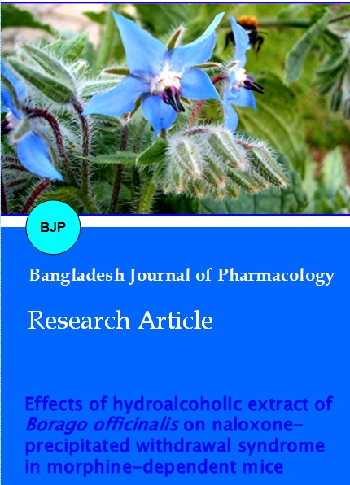Effects of hydroalcoholic extract of Borago officinalis on naloxone-precipitated withdrawal syndrome in morphine-dependent mice
DOI:
https://doi.org/10.3329/bjp.v11i4.26915Keywords:
Borago officinalis, Mice, Morphine, Naloxone, Withdrawal syndromeAbstract
The aim of the present study was to investigate the effect of hydroalcoholic extract of Borago officinalis on morphine withdrawal syndrome in mice. Morphine-dependent group received morphine for nine days and then received naloxone via intraperitoneal injection. Control group received saline for nine days. Post-treated group received B. officinalis extract intraperitoneally (100 mg/kg) on the day 10 before naloxone injection. Co-treated group received B. officinalis extract intraperitoneally (100 mg/kg) and morphine for nine days and then received naloxone. Extract-treated group received extract for nine days and then received naloxone. Naloxone injection significantly increased the frequency of jumping, blinking, ptosis, defecation, paw trembling, and two-legged standing in comparison to the control group. Co-treatment and post-treatment with B. officinalis extract significantly decreased the withdrawal symptoms. In conclusion, hydroalcoholic extract of B. officinalis significantly attenuated the symptoms of morphine withdrawal syndrome.
Video Clip of Methodology:
8 min 11 sec Full Screen Alternative
Downloads
197
171 Read
78 Feature
32

Published
How to Cite
Issue
Section
License
Authors who publish with this journal agree to the following terms:
- Authors retain copyright and grant the journal right of first publication with the work simultaneously licensed under a Creative Commons Attribution License that allows others to share the work with an acknowledgement of the work's authorship and initial publication in this journal.
- Authors are able to enter into separate, additional contractual arrangements for the non-exclusive distribution of the journal's published version of the work (e.g., post it to an institutional repository or publish it in a book), with an acknowledgement of its initial publication in this journal.
- Authors are permitted and encouraged to post their work online (e.g., in institutional repositories or on their website) prior to and during the submission process, as it can lead to productive exchanges, as well as earlier and greater citation of published work (See The Effect of Open Access).
